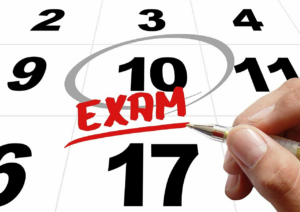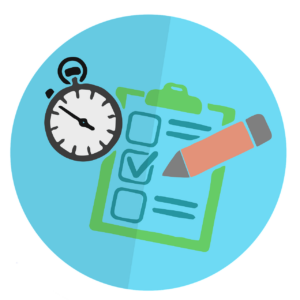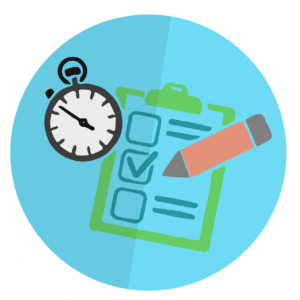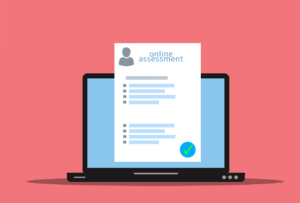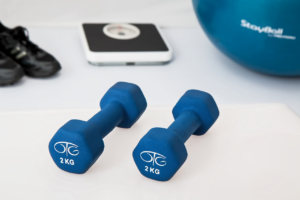Are you a nursing student preparing to take the NCLEX exam? Congratulations on reaching this important milestone in your career! As you begin to plan for the exam, it’s important to consider the timing of your test. Choosing the right date can make a big difference in your success on the exam.
In this article, we’ll explore the factors you should consider when deciding when to take the NCLEX. We’ll discuss how to assess your personal readiness, plan your study schedule, and choose a test date that works for you. We’ll also review some test-taking strategies to help you feel confident and prepared on exam day.
With the right preparation and timing, you can set yourself up for success on the NCLEX and take the next step in your nursing career.
Key Takeaways
- Personal readiness is crucial when choosing the right date for the NCLEX exam.
- Effective NCLEX exam preparation involves breaking down study material, utilizing study resources, and connecting with mentors and peers.
- Test-taking strategies such as practicing with NCLEX-style questions and seeking guidance from experienced nurses are important.
- It is essential to ensure that you’re fully prepared before setting a test date as the NCLEX exam is a significant investment of time and money.
Consider Your Personal Readiness
Don’t rush into taking the NCLEX exam before you feel completely confident and ready, or you risk feeling overwhelmed and anxious during the test!
The first step to timing your test for success is to consider your personal readiness factors. This involves conducting a thorough self-assessment to determine whether you have the knowledge, skills, and confidence necessary to pass the exam.
Importance of self-assessment can’t be overstated when it comes to passing the NCLEX exam. Ask yourself questions such as: Have I completed all the necessary coursework? Am I familiar with the test format and content? Have I practiced enough with NCLEX-style questions?
If the answer is no to any of these questions, it may be best to delay the exam and focus on building your knowledge and skills. Remember, taking the NCLEX is a significant investment of time and money, so it’s important to ensure that you’re fully prepared before setting a test date.
Plan Your Study Schedule
To plan your study schedule effectively, you need to set realistic study goals, create a study plan, and allocate time for practice tests and reviews.
Begin by setting attainable goals that will help you cover all the topics you need to learn. Then, create a study plan that includes specific times for studying, reviewing, and taking practice tests.
Finally, make sure to allocate enough time for practice tests and reviews to help you identify your strengths and weaknesses and adjust your study plan accordingly.
Set Realistic Study Goals
Achieving your study goals is crucial to feeling confident and prepared for the NCLEX exam. To set realistic study goals, you need to have realistic expectations of yourself and your study habits. Knowing how much time you have to study and managing that time effectively can help you set achievable goals.
You may want to start by breaking down your study material into smaller, more manageable sections. This can help you avoid feeling overwhelmed and allow you to focus on one topic at a time. Once you have a clear idea of what you need to study, you can create a study schedule that fits your lifestyle and allows you to cover the material in a reasonable amount of time.
Keep in mind that it’s important to allow yourself breaks and time to rest, as this can help you retain information better in the long run. By setting realistic study goals and managing your time effectively, you can feel more prepared and confident when it’s time to take the NCLEX exam.
Create a Study Plan
Developing a study plan that fits your schedule and breaks down material into manageable sections can help you feel more confident and prepared for the NCLEX exam. Creating a schedule is the first step in creating an effective study plan. Start by looking at your calendar and determining how much time you have available to study each day. Then, break down the material you need to cover into smaller sections that you can tackle in the time you have available.
To help you stay on track, it can be useful to create a table that outlines your study schedule. In the left column, list the days of the week, and in the top row, list the times of day. Then, fill in the table with the subjects or topics you plan to study during each time slot. This can help you stay organized and ensure that you cover all the material you need to before exam day. Additionally, finding resources such as study materials, practice tests, and review courses can also help you create a successful study plan. Look for resources that are tailored specifically to the NCLEX exam and that have been proven to be effective in helping students pass. By combining a well-designed study schedule with the right resources, you can feel confident and prepared when you take the NCLEX exam.
Allocate Time for Practice Tests and Reviews
Make sure you carve out dedicated time in your schedule to practice with sample tests and review materials. This is a critical step in your NCLEX exam preparation. Remember, practice makes perfect, and you want to be as prepared as possible before taking the test.
Creating a practice schedule will help you stay on track and ensure that you cover all the important topics. Focus on skill development and identify areas where you may need more focused study.
Be sure to take breaks and relax your mind when you need to. Remember, it’s important to stay motivated and positive throughout the process. With dedication, practice, and review, you’ll be well on your way to passing the NCLEX exam with flying colors.
Choose the Right Test Date
To ensure your success on the NCLEX exam, you should pick a test date that aligns with your study schedule and allows for ample preparation time. Here are some tips to help you choose the right test date:
-
Consider your study schedule and set a realistic timeline for exam preparation.
-
Avoid scheduling the exam during times of high stress, such as during the holidays or while in the middle of a major life event.
-
Choose a date that allows for enough time to take practice exams and review any areas of weakness.
-
Keep in mind that the NCLEX is offered year-round, so there’s no need to rush into taking the exam.
-
If possible, try to schedule the exam during a time when you’re feeling well-rested and mentally sharp.
By carefully choosing the right test date, you’ll be able to approach the NCLEX with confidence and maximize your chances of success. Remember to use test-taking strategies and exam preparation tips to help you perform your best on exam day. Good luck!
Review Test-Taking Strategies
Once you’ve picked the right test date, it’s important to review test-taking strategies to ensure that you’re fully prepared for the format and content of the NCLEX.
Effective techniques include practicing with NCLEX-style questions, utilizing review materials, and seeking guidance from experienced nurses. It’s also important to develop a strategy for the actual test day, such as managing your time wisely and utilizing all available resources.
Common mistakes include not taking enough time to prepare, relying solely on memorization instead of critical thinking skills, and not utilizing all available resources.
It’s important to remember that the NCLEX is a computerized adaptive test, meaning that the difficulty level of the questions will adjust based on your performance. Therefore, it’s important to remain calm and focused throughout the exam and trust in your preparation and test-taking strategies.
By reviewing effective techniques and avoiding common mistakes, you can increase your chances of success on the NCLEX exam.
Get Support and Guidance
When preparing for the NCLEX exam, it’s important to seek advice from mentors and peers who have already taken the test. They can provide valuable insights and tips on how to best prepare for the exam.
Consider joining study groups or review courses to further enhance your knowledge and skills.
Additionally, consulting with NCLEX experts can provide you with specific guidance and support to ensure success on your exam.
Seek Advice from Mentors and Peers
Connecting with mentors and peers can be a valuable resource for gaining insight and guidance on preparing for the NCLEX exam. The benefits of mentoring include having someone who has gone through the same experience and can offer advice and support. They can provide valuable feedback and share their own strategies for success.
Peers can also hold you accountable and motivate you to stay on track with your studies. It’s important to seek out mentors and peers who have a positive attitude, are knowledgeable about the NCLEX exam, and are willing to offer their time and expertise.
You can find mentors through professional organizations, nursing schools, or through personal connections. Peers can be found through study groups, online forums, or social media. By connecting with mentors and peers, you can gain the confidence and knowledge needed to pass the NCLEX exam and start your career as a registered nurse.
Consider Joining Study Groups or Review Courses
You’ve sought advice from mentors and peers, and now it’s time to consider joining study groups or enrolling in review courses. Not only can these resources help you prepare for the NCLEX exam, but they can also provide a sense of community and support during a stressful time.
The benefits of study groups are numerous. You can gain new perspectives and insights from your peers, work through difficult material together, and receive encouragement and motivation from others who are going through the same process as you.
When choosing the right review course, it’s important to consider factors such as cost, schedule, and the reputation of the course provider. A good review course can provide structure and guidance in your studying, as well as access to practice questions and other helpful resources.
Remember, you don’t have to go through this process alone, and there are many resources available to help you succeed.
Benefits of joining a study group:
- Increased motivation and accountability
- Ability to learn from peers and gain new insights
Factors to consider when choosing a review course:
- Cost and affordability
- Schedule and availability
- Reputation of the course provider
Consult with NCLEX Experts
Consulting with NCLEX experts can be a valuable resource for gaining insights and strategies to improve your chances of passing the exam. These experts have years of experience in NCLEX exam preparation and can provide you with expert advice tailored to your individual strengths and weaknesses.
They can help you identify areas that need improvement and offer helpful tips and tricks to help you succeed. NCLEX experts can also provide you with valuable information on the latest trends and changes in the exam.
With their knowledge, you can stay updated on the latest testing techniques and strategies that are most effective in passing the exam. By consulting with these experts, you can increase your confidence and competence in taking the NCLEX exam, giving you the best chance of success on test day.
Stay Motivated and Confident
You need to cultivate a positive mindset as you prepare for the NCLEX exam. Celebrate every achievement, no matter how small, to boost your motivation and confidence.
Learn how to manage test anxiety and stress so that you can stay focused and perform at your best.
Cultivate a Positive Mindset
By cultivating a positive mindset, test-takers can visualize success and approach the NCLEX exam with confidence. This means developing resilience and overcoming self-doubt. It’s important to remember that you have worked hard to get to this point, and that you are capable of passing the exam. When you approach the NCLEX with a positive outlook, you will be more likely to stay motivated and focused throughout the test.
One way to cultivate a positive mindset is by using positive self-talk. Instead of telling yourself that you can’t do it, remind yourself that you have studied hard and that you are prepared for the exam. Another technique is visualization. Picture yourself passing the exam and achieving your goal of becoming a licensed nurse. This can help you build confidence and reduce anxiety. By cultivating a positive mindset, you can approach the NCLEX with a sense of calm and confidence, which can improve your chances of success.
| Positive Affirmations | Meaning | Examples |
|---|---|---|
| I am capable | Belief in your abilities | I have prepared for this exam and am ready to succeed |
| I am resilient | Ability to overcome challenges | I have faced difficult situations before and come out stronger |
| I am focused | Ability to concentrate | I am able to stay focused on the exam and answer each question to the best of my ability |
| I am confident | Belief in yourself | I trust in my abilities and am confident in my knowledge |
| I am successful | Belief in achieving your goals | I will pass the NCLEX and become a licensed nurse |
Using positive affirmations can help you cultivate a positive mindset and build confidence as you approach the NCLEX exam. By focusing on your strengths and abilities, you can overcome self-doubt and stay motivated throughout the test. Remember that you have worked hard to get to this point, and that you are capable of passing the exam. Keep a positive outlook and visualize success, and you will be more likely to achieve your goal of becoming a licensed nurse.
Celebrate Your Achievements
Take a moment and pat yourself on the back – you’ve come a long way, and it’s important to celebrate your achievements on the path to becoming a licensed nurse.
Celebrating milestones is a great way to acknowledge your hard work and dedication. Whether it’s passing a practice exam, completing a difficult course, or simply making progress towards your goal, take the time to reflect on your accomplishments and give yourself credit for your efforts.
Self-reflection is also an important part of celebrating your achievements. Take some time to think about what you’ve learned and how you’ve grown throughout your journey. Recognize the challenges you’ve overcome and the skills you’ve developed.
By acknowledging your strengths and weaknesses, you can continue to improve and prepare for the NCLEX exam with confidence. Remember, every step forward is a step closer to achieving your goal of becoming a licensed nurse.
Manage Test Anxiety and Stress
Managing test anxiety and stress is crucial for achieving your goal of becoming a licensed nurse. The NCLEX exam is a significant milestone in your nursing career, and it’s natural to feel nervous about it. However, excessive anxiety and stress can negatively impact your performance, leading to poor results. To avoid this, you need to develop effective strategies to manage your emotions, such as mindfulness techniques and breathing exercises.
Mindfulness techniques involve being fully present and aware of your thoughts, feelings, and bodily sensations. It helps you stay grounded and focused, reducing anxiety and stress. Try practicing mindfulness by taking a few minutes each day to meditate or engage in mindful breathing exercises. Breathing exercises are another effective way to manage test anxiety. They help reduce physical symptoms such as rapid breathing, sweating, and heart palpitations. Deep breathing exercises, such as diaphragmatic breathing, can help regulate your breathing, calm your nerves, and enhance concentration. By incorporating these techniques into your study routine, you can manage test anxiety and stress effectively, improving your chances of success on the NCLEX exam.
| Mindfulness Techniques | Breathing Exercises | Benefits |
|---|---|---|
| Meditation | Diaphragmatic breathing | Reduces anxiety and stress |
| Yoga | Alternate nostril breathing | Improves concentration |
| Body scan | Box breathing | Enhances relaxation |
| Mindful breathing | 4-7-8 breathing | Regulates breathing |
| Gratitude journaling | Pursed lip breathing | Promotes positive emotions |
Using these techniques, you can align your mind and body, which will help you remain calm and focused during the exam. Remember that taking care of your mental health is just as crucial as studying for the NCLEX exam. By incorporating mindfulness and breathing exercises into your daily routine, you can manage test anxiety and stress effectively, ultimately leading to your success on the NCLEX exam.
Frequently Asked Questions
What is the passing score for the NCLEX exam?
To pass the NCLEX exam, you’ll need to meet the scoring criteria set by the National Council of State Boards of Nursing (NCSBN).
The passing standards are constantly reviewed and updated to ensure that only competent and safe nurses are granted licensure.
The passing score for the NCLEX exam isn’t a fixed number, as it’s determined by a complex algorithm that takes into account the difficulty level of the questions you answer correctly.
However, the NCSBN has set a minimum number of questions you need to answer correctly in order to pass the exam.
This number varies depending on the test taker’s performance, but it generally ranges from 60-75 out of 130-145 questions.
It’s important to note that the NCLEX exam isn’t designed to be an easy test, but with adequate preparation and a solid understanding of nursing concepts, you can achieve success.
Can the NCLEX exam be taken online?
Yes, the NCLEX exam can be taken online through online options that offer remote proctoring. This allows test takers to take the exam from the comfort of their own homes or locations, as long as they have a reliable internet connection and a computer that meets the requirements.
Remote proctoring ensures that the exam is monitored through audio and video feeds, and the proctor can intervene if any suspicious activity occurs. It’s important to note that not all states or testing centers offer online options for the NCLEX exam, so it’s important to check with your state board of nursing or testing center for availability and requirements.
How long does it take to receive NCLEX exam results?
After taking the NCLEX exam, it typically takes about 48 hours to receive your results. However, in some cases, it may take up to six weeks to receive your official results.
This NCLEX exam results timeline can be stressful and anxiety-inducing, but there are ways to prepare for this waiting period. One way to ease your anxiety is to distract yourself with other activities, such as spending time with friends and family or engaging in hobbies.
Another way is to mentally prepare yourself for the possibility of not passing and come up with a plan of action if that happens. By taking these steps, you can help alleviate some of the stress that comes with waiting for your NCLEX exam results.
What is the cost of taking the NCLEX exam?
The cost of taking the NCLEX exam varies depending on the state where you plan to take it. Exam fees range from $100 to $300, and some states may also charge additional fees for processing and application. Payment options typically include credit or debit cards, money orders, or electronic funds transfer.
Make sure to check with your state’s board of nursing for the most up-to-date information on exam fees and payment options.
Are there any restrictions on how many times the NCLEX exam can be taken?
If you’re planning to take the NCLEX exam, you might be wondering if there are any restrictions on how many times you can take it. The answer is yes, there are retaking restrictions.
You can take the NCLEX up to eight times per year, but there are waiting periods between attempts. The first time you take the exam, you have to wait 45 days before you can try again. If you fail a second time, you have to wait 90 days before your next attempt. If you fail three or more times, you have to wait 180 days between attempts.
To avoid having to retake the exam, it’s important to prepare well. Make sure you give yourself enough time to study, and take advantage of resources like practice tests and review courses. Additionally, make sure you’re mentally and physically prepared on exam day by getting enough sleep, eating a healthy meal, and arriving at the testing center early.
By following these exam preparation tips, you can increase your chances of passing the NCLEX on your first try.
Conclusion
So, there you have it! Taking the NCLEX exam isn’t an easy feat, but with the right preparation and mindset, you can surely succeed.
Remember, it’s important to consider your personal readiness and plan your study schedule accordingly. This way, you can make the most out of your review and increase your chances of passing the test.
Choosing the right test date is also crucial, as it can affect your level of preparedness and confidence. Don’t forget to review test-taking strategies and seek support and guidance from professionals or peers.
Lastly, stay motivated and confident throughout your journey towards becoming a licensed nurse. Trust yourself and your abilities, and you’ll surely conquer the NCLEX exam!


















